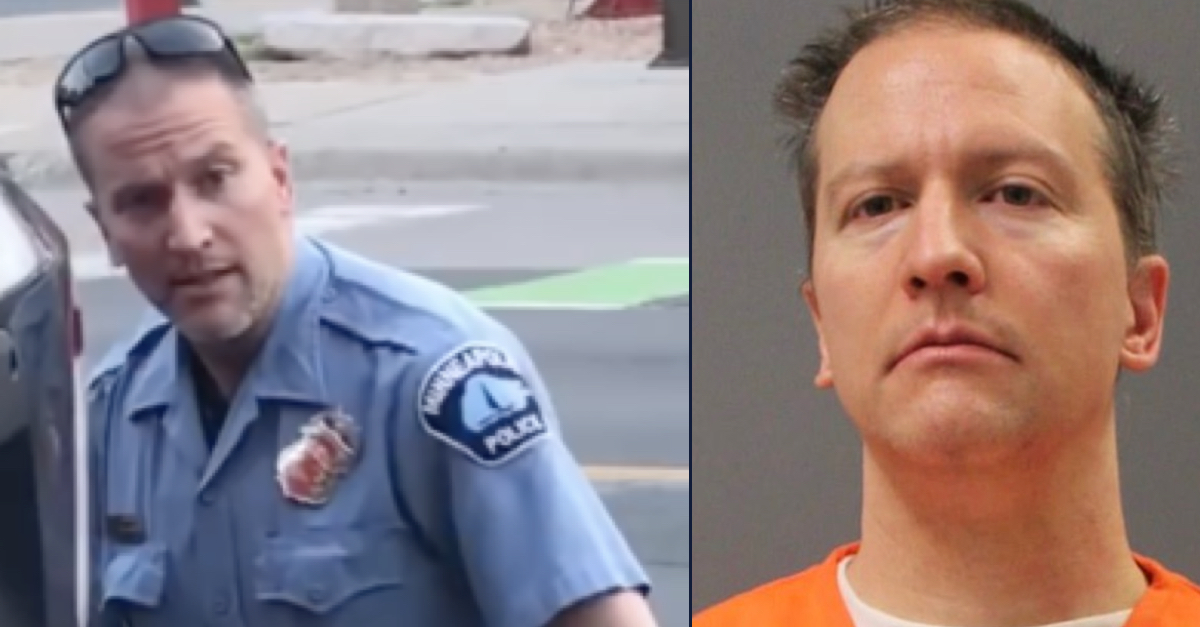
Derek Chauvin (screengrab via Facebook, post-conviction picture via Minnesota Department of Corrections)
Lawyers for the state of Minnesota said Wednesday that ex-police officer Derek Chauvin’s bid to vacate his convictions for the murder of George Floyd “says the quiet part out loud, and argues that police officers cannot ever be convicted of assault.”
“But the law authorizes officers only to use reasonable force,” according to a brief filed with the Minnesota Court of Appeals. “When officers use unreasonable force, the law holds them responsible.”
The filing, submitted by lawyers from the office of Attorney General Keith Ellison as well as private practice attorneys arguing on behalf of the state, said that Chauvin’s brief “raises an industrial kitchen-sink’s worth of arguments,” all of which are meritless, and is “riddled with factual errors, half-truths, and inaccuracies large and small.” Minnesota’s lawyers can’t respond to each, they wrote, but asked the judge to “consider this: Chauvin still maintains that ‘[p]utting your knees on the back of a suspect’ cannot kill someone.”
The lawyers said that Chauvin’s brief contains multiple misrepresentations.
“Notwithstanding the fact that Chauvin also placed his knee on Floyd’s neck, Chauvin’s assertion — and others like it — is flat out untrue,” the brief said. “As copious evidence proved, and as the jury found, restraining a person prone can cause positional asphyxia. Law enforcement has long known about positional asphyxia. Chauvin was specifically trained to avoid it. That is how George Floyd died. The truth matters.”
The brief, which calls for the appellate court to affirm Chauvin’s conviction, was filed in response to the opening brief filed April 25 from Chauvin’s attorney William F. Mohrman of Mohrman, Kaardal & Erickson in Minneapolis. That brief argues that Chauvin “is a police officer statutorily authorized to commit ‘assaults’ to effect an arrest” under Minnesota state law.
“Because police officers are duty bound to ‘assault’ suspects resisting arrest, Minnesota’s assault statute becomes a strict liability statute for a police officer because the officer always ‘intends’ to physically touch the suspect,” the Chauvin’s brief reads.
Wednesday’s reply brief said Chauvin “ignores the key limitation on his authorized-use-of-force defense: the law authorizes only ‘reasonable’ touches. Thus, even if Chauvin’s initial touching of Floyd had been reasonable at some point, Chauvin’s touch became unreasonable when Chauvin restrained Floyd face down on the ground for over nine minutes.”
The brief is signed by Assistant Attorney General Matthew Frank, whose team includes former acting U.S. Solicitor General Neal Katyal and his fellow partners at Hogan Lovells U.S. LLP in Washington, D.C., Danielle DeSaulniers Stempel, Nathaniel Avi Gideon Zelinsky and Dana A. Raphael, who are serving as special attorneys for Minnesota.
Chauvin is serving 22.5 years in state prison. He also pleaded guilty in federal to violating Floyd’s civil rights and was sentenced to 21 years. Three other police officers, J. Alexander Kueng, Tou Thao and Thomas Lane, were also charged in state and federal court. Keung was sentenced in July to three years in federal prison for violating Floyd’s civil rights, while Thao was sentenced at the same time to 42 months. Lane had been sentenced a week earlier to two years behind bars.
All three still have charges pending in state court of aiding and abetting second-degree murder and second-degree manslaughter.
Read the full brief below:
[Images of Derek Chauvin: screengrab via Facebook, post-conviction picture via Minnesota Department of Corrections.]